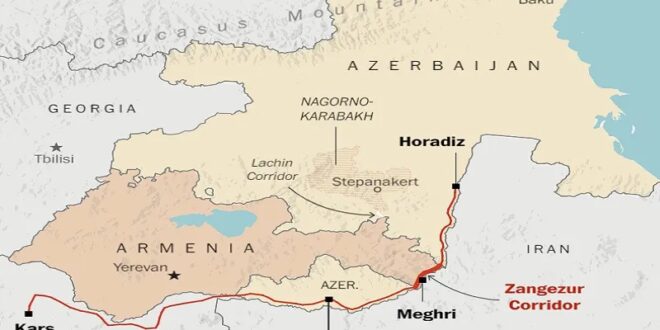The Washington Post produced an information warfare product, not a piece of journalism like its article is inaccurately presented to the masses as being.
The Washington Post (WaPo) just published a piece alleging that “After Nagorno-Karabakh, Azerbaijan eyes a strategic strip of Armenia”, which fearmongers that an East-West trans-Armenian connectivity corridor “could soon be at the center of a new war” involving all major regional players. Although the outlet acknowledges that this route was supposed to be opened as a result of the Moscow-mediated November 2020 ceasefire and guarded by Russian troops, it suspiciously omits two other relevant facts.
For instance, there’s no mention that Azeri-Turkish connectivity has already been achieved via Georgia years ago, which discredits the claim that “The Zangezur corridor is a broken link in a longer, potentially highly lucrative east-west route called the ‘Middle Corridor’”. Likewise, nowhere in the article is there any reference to the newly agreed Azeri-Iranian bridge over the Aras River that’ll function as an alternative to the Zangezur Corridor in the event that Armenia refuses to implement this project.
Without knowledge of these two other facts, readers are left with the false impression that the Zangezur Corridor is much more strategic than it actually is, thus misleading them into thinking that a regional war over it is indeed supposedly brewing. That’s not to rule out the scenario of another Azeri-Armenian conflict, but just to downplay the likelihood that it would be over that route seeing as how Azeri-Turkish connectivity already exists via Georgia and a complementary corridor is being pioneered through Iran.
WaPo therefore produced an information warfare product, not a piece of journalism like its article is inaccurately presented to the masses as being, which serves the purpose of manipulating Armenians into distrusting Russia and placing their faith in the West instead. This aim isn’t speculative either since the text contains subjective claims of Armenia having supposedly been “betrayed by Moscow” over Karabakh that are authoritatively passed off as fact to unaware readers.
To fact-check the preceding passage, the reality is that Russia’s peacekeepers never had any mandate to prevent another outbreak of violence in that region since all that they were tasked to do is monitor the ceasefire and report violations. Furthermore, Armenian Prime Minister Pashinyan himself twice reaffirmed over the past 12 months that he recognized Karabakh as Azerbaijani just like literally every other member of the international community does.
It’s therefore counterfactual to claim that Russia “betrayed” Armenia over Karabakh, but saying so anyhow extends credence to the piece’s subsequent claims pertaining to Azerbaijan’s alleged intent to annex internationally recognized Armenian territory, which WaPo also says that Russia supports. In pursuit of these supplementarily false narratives, the outlet spun one of Azeri President Aliyev’s statements and then said that Russia “backs” this plan, though neither is actually true.
Not only are Armenians’ perceptions manipulated by this information warfare product, but so too are Westerners, which could lead to the artificial manufacturing of public support for their governments’ forthcoming meddling in the South Caucasus on the pretext of defending that country from aggression. Never mind that there’s no credible threat from which Armenia requires protection, nor that it’s still formally part of the Russian-led CSTO, since all that matters is how this meddling is sold to the masses.
 Eurasia Press & News
Eurasia Press & News



